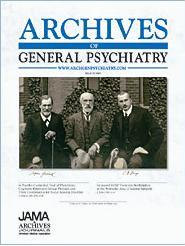

At our most recent UCSF Division of Geriatricsjournal club, we had a very lively discussion about an article examining whether older persons with a sense of “purpose in life” were less likely to develop Alzheimer Disease. This excellent article, by Dr. Patricia Boyle, is in the March issue of the Archives of General Psychiatry. It is the latest report from the ground breaking Rush Memory and Aging Project.
A lot of research on Alzheimer disease examines more “biologic” risk factors, sucn as markers found in blood or findings on brain MRI scans. This work is very important, but there is also compelling evidence that psychosocial risk factors may be profoundly important determinants of Alzheimer Disease. There is much less research support focused on psychosocial mediators, and that makes this study a welcome addition.
The investigators followed a group of over 900 elderly Chicagoans (average age of 80) for an average of 4 years and compared rates of Alzheimer Disease (as well other cognitive outcomes) in persons who had high and low purpose in life scores.
The operational definition of purpose in life was, “the tendency to derive meaning from life’s experiences and to possess a sense of intentionality and goal directedness that guides behavior.” The authors used a ten item scale to measure purpose in life. Here are some sample items (an elder with high purpose in life would strongly agree with these statements):
- I have a sense of direction and purpose in life
- I am an active peson in carrying out the plans I set for myself
- Some people wander aimlessly through life, but I am not one of them
Overall, 16% of subjects were diagnosed with Alzheimer Disease during follow-up. Having more of a sense of purpose was strongly protective against Alzheimer Disease. Those scoring in the highest 10% of subjects on the sense of purpose scale were 2.4 times more likely to remain free of Alzheimer disease than a person scoring in the lowest 10%. This relationship remained strong after adjusting for a number of other predictors of cognitive change.
Does this study prove having a sense of purpose protects against Alzheimer disease? Probably not. Studies of Alzheimer Disease risk factors are quite complicated, and because of this, no one study can be definitive–even a well designed study such as this one.
What makes these studies so difficult is that the process of cognitive decline that results in Alzheimer disease seems to be a very long process. And brain changes that lead to cognitive decline may also start many years before one can recognize any cognitive problems. This creates a “chicken and egg” problem in most epidemiologic studies of Alzheimers disease. What you think is a risk factor may actually be part of the Alzheimer disease process.
In terms of purpose in life, one complicating issue is that there is inreasing recognition that apathy may be an important part of the clinical picture of Alzheimer disease. Some think apathetic behavior may proceed the cognitive changes that occur in Alzheimer Disease. Perhaps this apathy could in part manifest itself as a lessened sense of purpose.
To address this issue, Boyle and colleagues repeated their analysis eliminating diagnoses of Alzheimer Disease in the first 3 years of follow-up. This did not change the strength of association between sense of purpose and Alzheimer Disease, and this does increase the probability that the relationship between sense of purpose and Alzheimer Disease is causal. But in terms of the natural history of the processes that cause Alzheimer Disease, 3 years is relatively short, and not a long enough exclusion period to fully address the chicken-egg problem.
So, overall, I would say this study significantly adds to the evidence that a greater sense of purpose in life protects against Alzheimer Disease. To understand this relationsihp more definitively, it will be necessary to replicate this finding in other datasets, and do studies with longer follow-up.
One thing that is clear from this study is that there is a very important relationship between sense of purpose in life and Alzheimer disease. Showing this linkage significantly adds to our understanding of Alzheimer disease, irrespective of the direction of this association.



